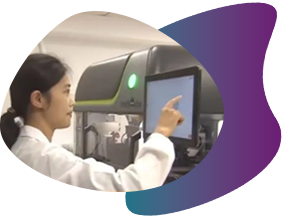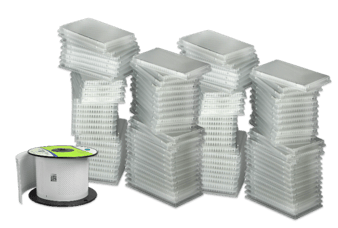Originally published : Fri, January 14, 2022 @ 9:50 PM
Updated : Thu, January 12, 2023 @ 5:10 PM
Rice is the primary staple for more than half the world's population.1 With so many people relying on the crop for survival, plant breeders depend on novel breeding methods and technologies to support the development of improved rice varieties. Over the past five decades, hybrid rice, for example, has improved crop yield potential and agronomic performance compared to conventional inbred varieties. More recently, advancements in marker-assisted breeding have enabled further efficiencies, reducing the time it takes to get new rice products to market.
What are the benefits of hybrid rice?
There are three distinct advantages of hybrid rice varieties over conventional inbreds. They are:
- Increased crop yields
- Increased vigour
- Increased resistance to diseases and insects.2
These benefits result from heterosis (also called hybrid vigour), which is a consequence of crossing two genetically distinct parents. Producing hybrid rice varieties increases genetic diversity, bestowing agronomic characteristics that improve abiotic and biotic stress tolerance and promote higher crop yields.
Research to support hybrid rice variety development began in 1964, led by the “father of hybrid rice”, Longping Yuan.3 He developed the first hybrid rice varieties in the 1970s, using a three-line hybrid breeding method, and perfected a two-line technique in the 1980s to simplify seed production processes. The three-line hybrid rice system, based on cytoplasmic male sterility, and the two-line hybrid rice system based on photoperiod- and thermo-sensitive genic male-sterile lines have resulted in significant rice yield improvements and greater food security for those that rely on the crop as a primary calorie source.4
Agrigenomics in action
Since hybrid rice research began in 1964, plant breeders have come a long way in developing varieties with improved agronomic characteristics. Innovations in molecular breeding allow breeders to select for traits of interest more accurately and efficiently, which gets new products to market faster than ever before.
LongPing High-Tech, one of the leaders in hybrid rice development, has evolved its breeding strategy over the years to capitalise on the latest agrigenomics technology. Initially, the company relied on traditional electrophoresis-based platforms to conduct molecular marker-assisted breeding; however, those platforms restricted efficient genotyping as the breeding programme scaled. Labour-intensive electrophoresis methods limited throughput for rice breeders, often delaying time-sensitive breeding decisions. As LongPing High-Tech’s commercial breeding services continued to grow, they sought new genotyping methods to support more accurate and efficient marker-assisted breeding efforts.
 In 2019, LongPing High-Tech incorporated the IntelliQube™ qPCR system into its rice breeding programme, significantly improving testing efficiency compared to previous genotyping methods. The platform can test nearly 40,000 data points during its daily runtime, costing the company only a few cents per test. Since 2019, LongPing High-Tech has steadily increased the number of analysed data points from hundreds of thousands to over one million this year, owing in part to significant improvements from streamlined testing workflows.
In 2019, LongPing High-Tech incorporated the IntelliQube™ qPCR system into its rice breeding programme, significantly improving testing efficiency compared to previous genotyping methods. The platform can test nearly 40,000 data points during its daily runtime, costing the company only a few cents per test. Since 2019, LongPing High-Tech has steadily increased the number of analysed data points from hundreds of thousands to over one million this year, owing in part to significant improvements from streamlined testing workflows.
" The fully automated process is simply 'sample in, data out.' "
- LongPing High-Tech
Capitalise on improved efficiencies for marker-assisted breeding
LongPing High-Tech’s success in developing hybrid rice varieties has demonstrated how automated, high-throughput genotyping platforms can improve breeding outcomes. The IntelliQube enables high-throughput genotyping that provides actionable data for breeders to make well-informed decisions in less time. It used to take LongPing High-Tech breeders 8 to 10 years to deliver a new rice variety. That time has been reduced to only 4 to 5 years as breeders moved from experiential breeding to precision breeding enabled by modern agrigenomics.
Customise your workflow
The platform is the most flexible high-throughput qPCR system available and supports multiple experimental modes suited for carrying out a variety of processes, from primer selection to large-scale production and routine screening. End users have the freedom to completely customise workflows according to their application. LGC, Biosearch Technologies™ has a wide selection of probe technologies compatible with the IntelliQube’s end-point and real-time PCR modes, allowing for versatile assay design.
Reduce high-throughput genotyping costs
IntelliQube’s innovative design reduces a lab’s chemistry, consumable and labour costs by using Array Tape™, a thin and flexible polypropylene consumable that facilitates inline and integrated automation of an entire laboratory process. Array Tape is an alternative to microplates, resulting in reagent savings of up to 90% with miniature reaction volumes as low as 1.6 μL. The IntelliQube also supports multiplexing with rapid detection across five detection channels, facilitating the collection of more data points per reaction for more efficient, cost-effective testing.
" The whole testing process works efficiently, empowering staff to select and breed seeds both faster and more precisely. "
- LongPing High-Tech
The platform integrates multiple instruments into one, simplifying the workflow with walk-away operation to reduce manual labour. Assay preparation, plate sealing, qPCR cycling and detection are consolidated on a single system rather than across multiple instruments.
Increase sustainable practices
| The IntelliQube supports more sustainable lab practices by reducing reagent, plastic and energy consumption. Reagent storage, handling and disposal are significantly reduced due to smaller reaction volumes in Array Tape versus 384-well microplates. Seven times more plastic is required to manufacture a 384-well microplate compared to a 384-well array in Array Tape. Also, the Array Tape spools’ water bath thermal cycling capabilities reduce energy consumption compared to the hundreds of block heaters required in traditional setups, which require 35 times more energy. |
One spool of Array Tape versus how many plates it would replace. |
Partner with a leader in agrigenomics
Biosearch Technologies has proven experience and credentials to support a variety of agrigenomics applications. From genotyping to next generation sequencing, our team can offer solution-focused recommendations to enhance your breeding strategy. Whether it’s an early-stage R&D project or a high-throughput commercial application, we can help you reach a new level of productivity with our innovative products and services and dedicated customer service. Learn more about how we can help you cultivate advanced agrigenomics of tomorrow.
References
- U.S Department of Agriculture Economic Research Service. Rice Sector at a Glance. https://www.ers.usda.gov/topics/crops/rice/rice-sector-at-a-glance/. Published November 2021. Accessed December 12, 2021.
- International Rice Research Institute. Hybrid rice. http://www.knowledgebank.irri.org/training/fact-sheets/crop-establishment/item/hybrid-rice-fact-sheet. Accessed December 12, 2021.
- Barclay A. A hybrid history. Rice Today. 6(4):22-25. https://www.scribd.com/document/97891456/RT-Vol-6-No-4-A-hybrid-history#fullscreen. Published 2007. Accessed December 12, 2021.
- Wang H and Wang Deng X. Development of the “Third-Generation” Hybrid Rice in China. Genomics, Proteomics & Bioinformatics. 16(6):393-396. https://doi.org/10.1016/j.gpb.2018.12.001. Published December 2018. Accessed December 12, 2021.


